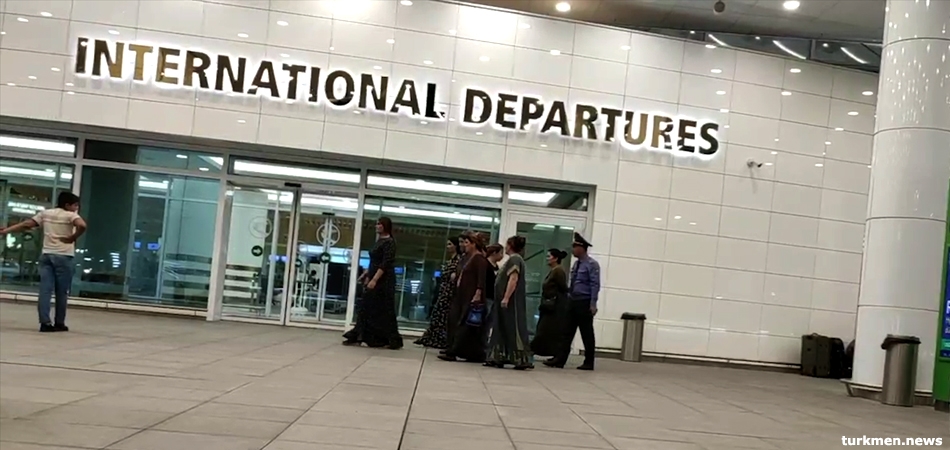
The number of Turkmen citizens giving up their citizenship has increased steadily in the past few years.In 2021, 404 people renounced their citizenship, an increase of one-third compared to 2020, when 319 gave up citizenship.
Meanwhile, in the first half of 2022 alone, 263 people renounced their Turkmen citizenship, according to documents Turkmen.news has in its possession.Ashgabat International AirportThen President Gurbanguly Berdimuhamedov granted requests to renounce citizenship twice in 2021, in May and November.
This applied to 190 people in the spring and 214 in the fall.The previous year he had granted requests only once — in May.The majority of those renouncing their citizenship in 2021 were Russian — 154 people.
Kazakhs came second — 77, Turkmen third — 53, Armenians fourth — 26, Ukrainians fifth — 20, Azerbaijanis sixth — 17, and Uzbeks seventh — 11.Those giving up their Turkmen citizenship also included, respectively, six Persians, Lezgis and Tatars, five Germans and Uyghurs, four Koreans and Turks, three Jews, two Ossetians and one Gagauz, Dargin, Karakalpak, Gypsy, and Afghan.
Serdar Berdimuhamedov who became president in March 2022 confirmed the list of 263 people renouncing citizenship in May.That list includes, respectively, 89 Russians, 49 Turkmen and Kazakhs, 23 Armenians, 13 Azerbaijanis, 12 Uzbeks, nine Tatars, three Kurds and Belarusians, two Moldovans and Laks, one Iranian, Uyghur, Georgian, Jew, Karakalpak, Lezgi, Turk, Ossetian, and Ukrainian.Turkmen.news also has in its possession a list of applicants who received Turkmen citizenship in September 2021 — 2,656 people.
This does not mean, however, that more people are immigrating to Turkmenistan than emigrating from the country.Decisions on granting citizenship applications are taken with far less frequency, so the lists include large numbers of applicants.
In 2021 many of them finally received a Turkmen passport after decades of waiting.The majority of those who took citizenship are Uzbeks — 1,772, more than half the list.
It is difficult for ethnic Uzbeks to receive citizenship.Many of them came to Turkmenistan just after the collapse of the USSR, but have had to wait until now to receive a positive decision on their application.
It’s not easy for ethnic Turkmen either: there are 746 of them on the list, and also 28 Azerbaijanis, 27 Russians and a lower number (fewer than 100) of other ethnicities.It is interesting that those granted citizenship include seven children born in 2021, 13 children born in 2020 and 2018 respectively, and 29 children born in 2017.
So, while settlers arriving in the country are waiting for citizenship they have children who then become citizens alongside their parents.For comparison, those who renounced their citizenship in 2022 included two children born in 2021, both in their respective historic homelands, Kazakhstan and Azerbaijan.
An ethnic Turkmen girl born in Germany on December 31, 2020 also lost her citizenship.These children, born straight after their parents emigrated, were automatically recognized as citizens of Turkmenistan but their families immediately applied to renounce that status.As for adults, those who gave up their citizenship in 2022 include 59 people born in the 2010s, 37 in the 2000s, 39 in the 1990s, 65 in the 1980s, 37 in the 1970s, 13 in the 1960s, eight in the 1950s and two people born in the 1940s.The current size of the population of Turkmenistan is not known.
Officially, there are more than six million Turkmen citizens.However, independent sources have frequently stated, often citing unpublished data from the census of 2012, that the real number of people living in Turkmenistan is almost half that figure.
It is worth noting that far from all migrants who have lived abroad for years renounce their Turkmen citizenship.The authorities’ concern at the fall in the real size of the population is probably one of the reasons they had the visa-free regime with Turkey cancelled in September 2022.
Until then, Turkey had been the only country that did not require a visa for Turkmens, making it the most popular destination for large numbers of labor migrants.
